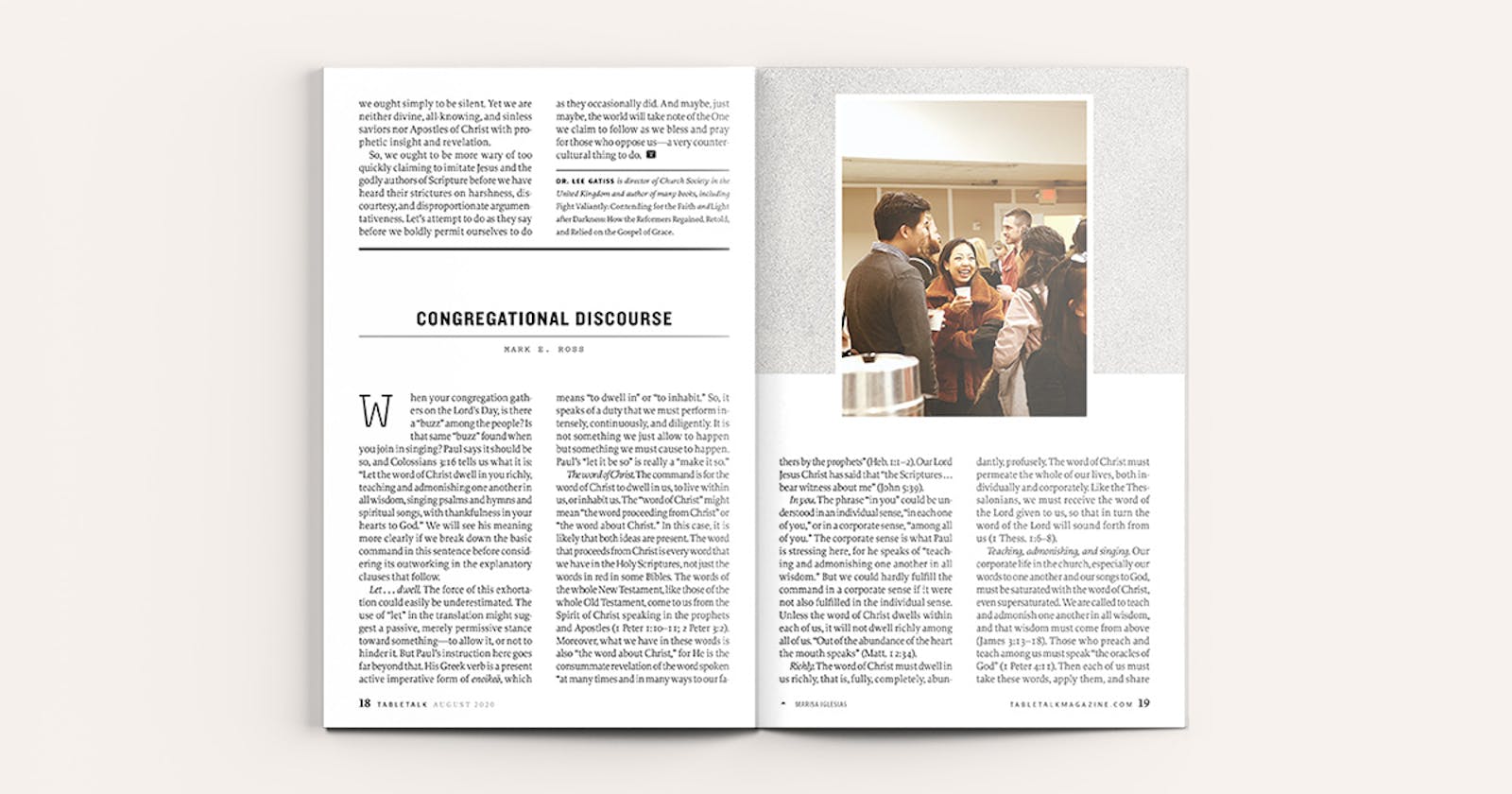
Request your free, three-month trial to Tabletalk magazine. You’ll receive the print issue monthly and gain immediate digital access to decades of archives. This trial is risk-free. No credit card required.
Try Tabletalk NowAlready receive Tabletalk magazine every month?
Verify your email address to gain unlimited access.
When your congregation gathers on the Lord’s Day, is there a “buzz” among the people? Is that same “buzz” found when you join in singing? Paul says it should be so, and Colossians 3:16 tells us what it is: “Let the word of Christ dwell in you richly, teaching and admonishing one another in all wisdom, singing psalms and hymns and spiritual songs, with thankfulness in your hearts to God.” We will see his meaning more clearly if we break down the basic command in this sentence before considering its outworking in the explanatory clauses that follow.
Let . . . dwell. The force of this exhortation could easily be underestimated. The use of “let” in the translation might suggest a passive, merely permissive stance toward something—to allow it, or not to hinder it. But Paul’s instruction here goes far beyond that. His Greek verb is a present active imperative form of enoikeō , which means “to dwell in” or “to inhabit.” So, it speaks of a duty that we must perform intensely, continuously, and diligently. It is not something we just allow to happen but something we must cause to happen. Paul’s “let it be so” is really a “make it so.”
The word of Christ. The command is for the word of Christ to dwell in us, to live within us, or inhabit us. The “word of Christ” might mean “the word proceeding from Christ” or “the word about Christ.” In this case, it is likely that both ideas are present. The word that proceeds from Christ is every word that we have in the Holy Scriptures, not just the words in red in some Bibles. The words of the whole New Testament, like those of the whole Old Testament, come to us from the Spirit of Christ speaking in the prophets and Apostles (1 Peter 1:10–11; 2 Peter 3:2). Moreover, what we have in these words is also “the word about Christ,” for He is the consummate revelation of the word spoken “at many times and in many ways to our fathers by the prophets” (Heb. 1:1–2). Our Lord Jesus Christ has said that “the Scriptures . . . bear witness about me” (John 5:39).
In you. The phrase “in you” could be understood in an individual sense, “in each one of you,” or in a corporate sense, “among all of you.” The corporate sense is what Paul is stressing here, for he speaks of “teaching and admonishing one another in all wisdom.” But we could hardly fulfill the command in a corporate sense if it were not also fulfilled in the individual sense. Unless the word of Christ dwells within each of us, it will not dwell richly among all of us. “Out of the abundance of the heart the mouth speaks” (Matt. 12:34).

Richly. The word of Christ must dwell in us richly, that is, fully, completely, abundantly, profusely. The word of Christ must permeate the whole of our lives, both individually and corporately. Like the Thessalonians, we must receive the word of the Lord given to us, so that in turn the word of the Lord will sound forth from us (1 Thess. 1:6–8).
Teaching, admonishing, and singing. Our corporate life in the church, especially our words to one another and our songs to God, must be saturated with the word of Christ, even supersaturated. We are called to teach and admonish one another in all wisdom, and that wisdom must come from above (James 3:13–18). Those who preach and teach among us must speak “the oracles of God” (1 Peter 4:11). Then each of us must take these words, apply them, and share them among ourselves, supporting and encouraging one another with them, and when necessary warning and admonishing one another by them. Paul’s special concern here is that the word of Christ dwell richly among us in our singing, for in that way, too, we teach and admonish one another in all wisdom, with thankfulness in our hearts to God. We should return back to God in song all that He has revealed to us in His Word. The psalms, hymns, and spiritual songs we sing should embody the whole counsel of God, not just the favorite parts we most enjoy or cherish.
This is the “buzz” that should be heard in our congregational discourse. Will it be heard in your church this coming Lord’s Day? Will the word of Christ be dwelling among you richly, or just barely?
